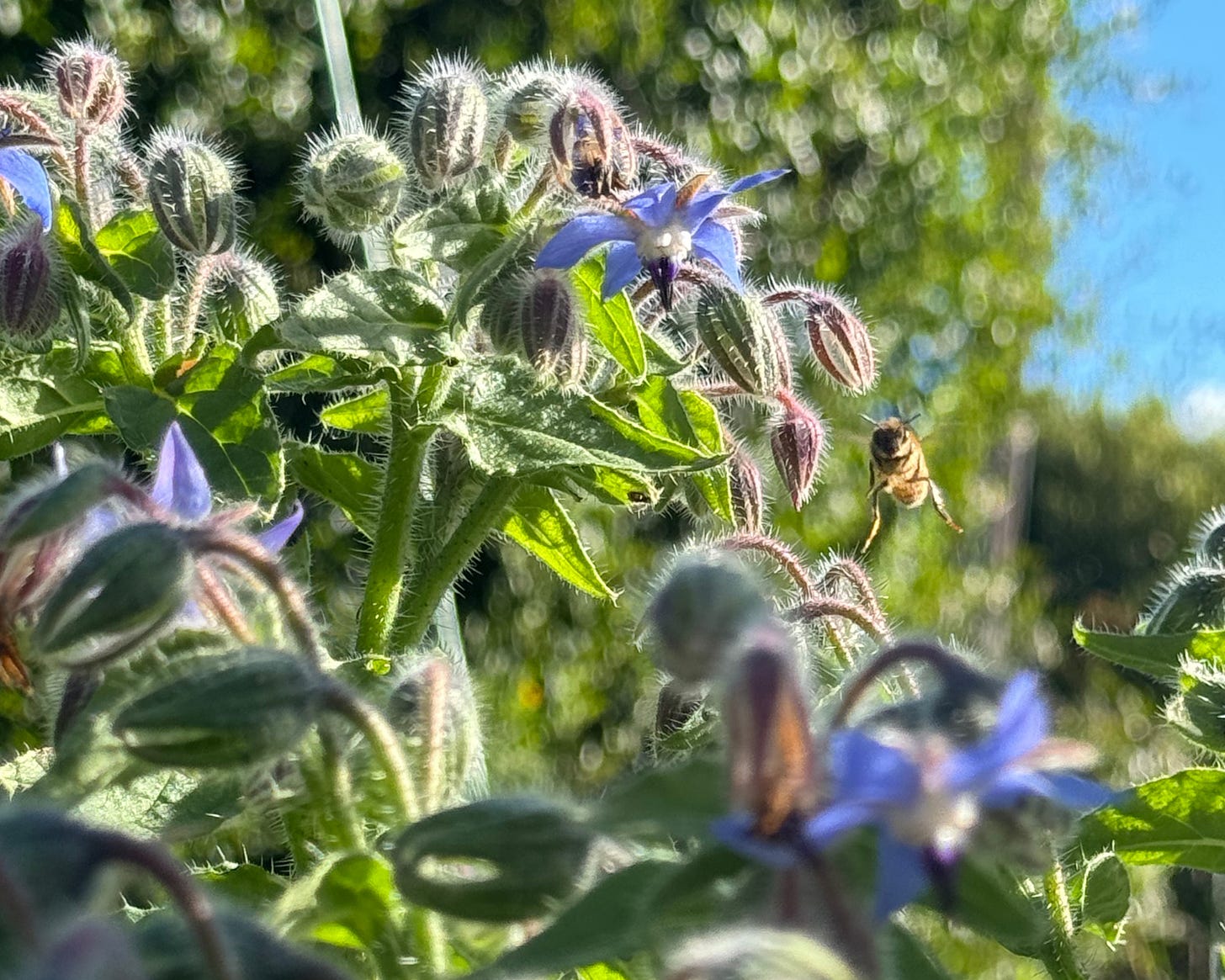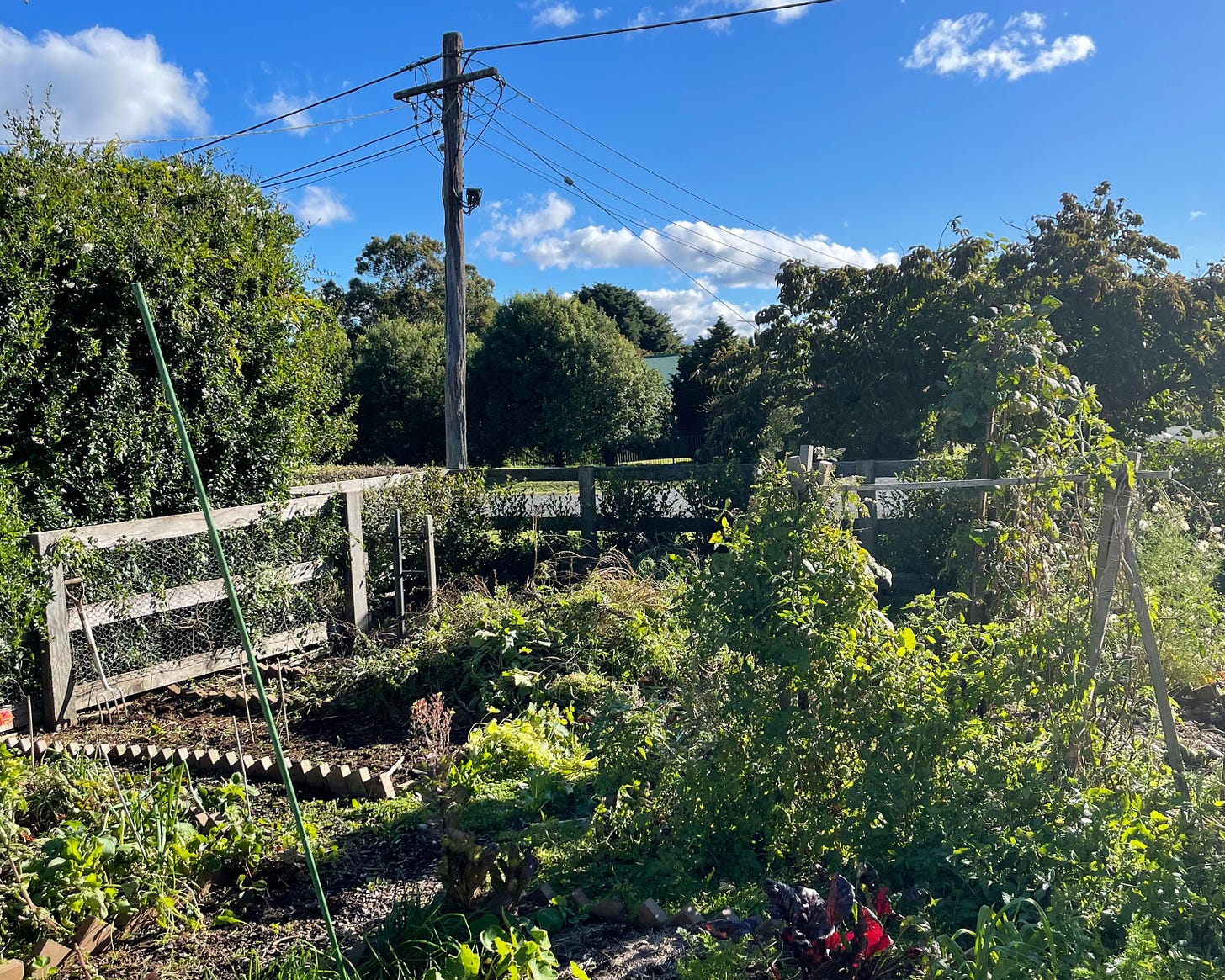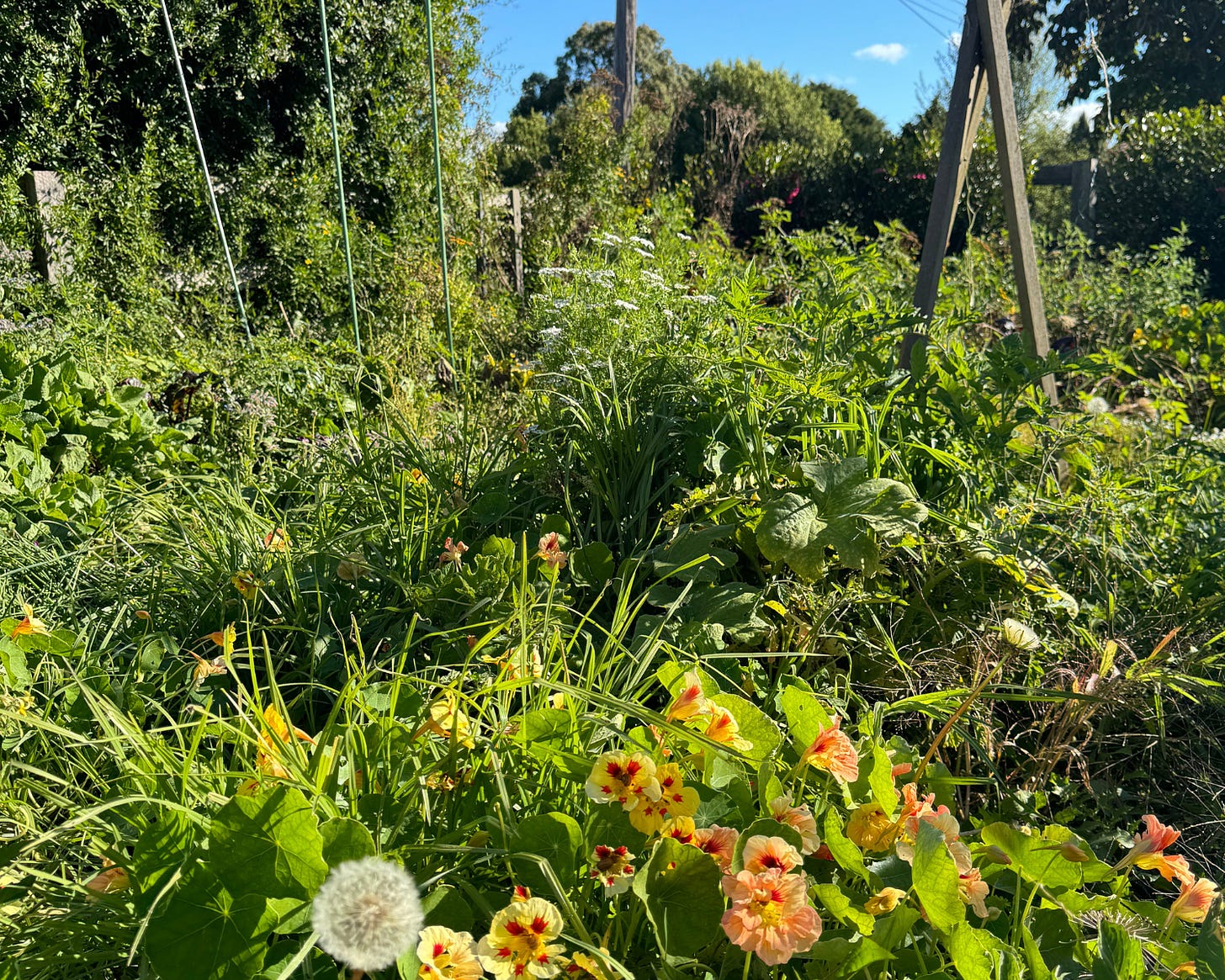This voiceover is an audio version of the newsletter below. As always, it’s unedited so probably features some stutters and re-starts. If you like/need to listen to these posts I hope you enjoy it.
Hello mates!
Before I get into today’s letter, just some thoughts after last week’s post.
I was so grateful to read your responses to the idea of living rebelliously, which ran the emotional gamut — from relief to excitement to exhaustion at even the thought of doing more.
I have to admit though, that while reading all your comments, I was struck with an overwhelming emotion that made me seriously reconsider the topic altogether.
That emotion was fear.
I was so afraid that my version of rebellion wouldn’t stack up to yours. That it would be too small and too insignificant, undeserving of the title of rebellious living. Because even the phrase itself seems to conjure up punk-rock ideals, flipping the middle finger at anyone who stands in our way, whereas the rebellion I’m drawn to is softer than that. It’s gentler than that. And it’s (usually) less combative.
It’s slow rebellion. It’s values-aligned and very much against the status quo, but in a way that’s both challenging and invitational. It’s less punk-rock and more granny-punk (if that’s a thing?) It won’t pull its punches when talking about our choices and values and actions, but it will make us a cup of tea while doing so.
Because when we consider the status quo we’re all fed up with to varying levels, its maintenance requires us to hustle and consume and chase. To submit to burnout and brain-numbing levels of information. Acknowledge our overwhelm and shrug, “It is what it is. What can you do?”
To rebel against that is to slow down, to rest, to question the information and stuff and the sheer amount we consume, to generously wonder what we’re chasing and why. It can be protesting and organising and campaigning, but it can also be as simple (and as difficult) as living our lives with conviction. Having conversations when they arise. Finding ways to rebel from within the mainstream.
I can’t tell you how many people have shared that my decision to take time off last term spurred them to take time in their own lives. Not because what I did was amazing, but because it goes against the norm. We’re told to bounce back, recover, get back on our feet and return to being productive as quickly as possible. So much so that the simple (and difficult) act of saying no and taking time looks rebellious.
It shouldn’t. But it does. So that’s where we start our exploration of rebellion. Not at the big, seemingly more worthy end, but at the small, simple (and again, difficult) end.
This kind of rebellion is really about looking at what passes for modern life and questioning it. The stresses, the expectations, the shoulds and to-dos and must-buys — learning how to run them through a filter of our own values.
Everyone’s rebellion will look different, which is beautiful and as it should be.
And with that, on to today’s letter, where I explore fallowness — which feels rebellious in both allowing it, and redefining what it means.
I’ve spent the past few months experiencing many feelings, but the overwhelming one has been frustration. Deep-rooted, soul-tearing frustration.
There’s so much I haven’t been able to do. So much potential lost. So much time passed with nothing tangible to show for it. I have felt useless and unworthy and unneeded. I have seen so many of my efforts in so many areas of life collapse into what seems like a bitter waste.
Take my front yard veggie garden for example. I’ve put years of effort into it. I’ve planted berries and apples and figs and cherries. I’ve grown dill and beans and tomatoes and carrots and beetroot and spinach and lettuce and radish. I’ve fed the soil and encouraged the good bugs. I’ve coaxed and watered and harvested and added compost. I have left so much of myself in that garden — hopes and dreams and bad moods and quite literally blood, sweat and tears, as cliched as that might seem.
But beyond picking berries, netting half the apples and watering it all when things started to droop in the summer heat, I have done virtually nothing to my garden since just before Christmas. Planted nothing, tended nothing, fed nothing. All plans were abandoned (and I had many plans). My health just didn’t allow for any output, so I had to resign myself to the f-word. I needed to let my garden, and myself, become fallow.
For weeks I ran that word through my mind…fallow.
It meant dormancy. Hibernation. It brought to mind cold days and grey skies and unproductive soil; a garden put to bed like a sleeping child. Not a bad thing in winter, but this was summer! And no child wants to be sent to bed early in the long, warm days of summer.
But then I looked it up, and it turns out that while fallow can mean dormant, it also means “untilled; left unsown”. In other words, it can also be what happens when we let go and let nature do her thing.
So, very begrudgingly, I let go.
I watched over weeks, and then after my surgery, over months, as that garden slipped into neglect, eventually morphing into a wild, weed-choked tangle. I watched as the paths disappeared under sprawling plants and my carefully laid garden edges were swallowed whole by the wave of green we could usually hold at bay.
I struggled with it. I felt shame around it. It was messy and chaotic and a reminder of my failings.
Then, out of nowhere, our daughter told me how much she loved the veggie garden. She said it made her happy because it was wild and chaotic and did its own thing. Then, a few weeks later, a friend said something similar. (Actually, she told me it reminded her of
’s garden and no greater a compliment have I ever received!)But it wasn’t until I ventured out there a few weeks after I got home from hospital and saw what it had become that I understood. It was wild. It was messy. It had completely engulfed the pretence of order I’d tried to create. It was also a buzzing, vibrant world, full to the brim with colour and life and flowers.
While I wasn’t watching, my so-called fallow garden had become a riot of life. It was nature running rampant. It was hundreds of butterflies and crickets and beetles. The chorus of currawongs and tiny white frogs that live in the middle of the dandelions. Dozens of different flowers blooming all at once, vibrating with bees and hoverflies and moths and birds I’d never seen in this garden before.
As I carefully picked my way through what used to be a path but was now just another space filled with life, I also saw what I couldn’t spot from inside. Tomatoes — hundreds of them. Sprawling pumpkin vines. Lettuce and carrot and herbs that had all self-seeded in the untouched soil. Strawberries and blueberries and rhubarb that were somehow more prolific than any other year. Apple trees and our massive fig literally bending under the weight of fruit.
Fallow wasn’t barren. Fallow wasn’t failure. Fallow was bursting at the seams with the kind of life and vigour I could never have forced from my garden. Fallow helped seeds I’d planted years ago spring into life.
Over the past few weeks, as I’ve continued to heal and regain my strength, I’ve gone out to my garden almost every day. I’m completely humbled by what it has become and have brought inside armfuls of apples, figs, lettuce, silverbeet, herbs and tomatoes. More importantly though, I’ve also brought inside delight and awe and wonder. I’ve brought in permission to be fallow, to see what might happen when I let nature do her thing.
Because yes, fallow means untilled, to be left unsown, to allow nature to take over. It sometimes means dormant, but it doesn’t mean dead. It doesn’t mean failure. It definitely doesn’t mean wasted time. It means resting, in order to create something new. Resting, in order to let go and let nature do her thing. Resting, so we can see what comes next.
It’s gentle, but that doesn’t mean it’s not rebellious.
When was the last time part of your life felt fallow? Did you struggle with it like me? Could you ever see yourself viewing it as a gentle act of rebellion?
I’m currently…
Reading Iron Flame by Rebecca Yarros. I’m usually vaguely disappointed by super-hypey books but I’m unapologetically loving The Empyrean series. Great fantasy world-building with a healthy side serve of spice.
Watching Steve! (Martin): A documentary in two pieces on Apple TV. I’ve long loved Steve Martin as an actor but had no idea he was the original arena comedian. A really good documentary about a really fascinating person.
Making a granny square cover for an old, torn throw cushion. A perfectly low-stakes project for chilly nights.
Listening to Afro Harping by Dorothy Ashby. Ben had it on his Spotify and I loved it. On high rotation.
Keeping track of my 1% efforts this term. So far, so good. I might not be able to handle workouts two days in a row, but I can definitely stretch or go for a walk or do some yoga.
That’s it from me for today. I’ve got a date with my novel manuscript (I’m about a quarter of the way through Draft #4 and it’s starting to feel like a real story) and a cup of tea.
Here’s to tiny moments of fallowness in your week. Take good care.
Brooke xx








Bloody lovely Brooke.
Anna Hooking's poem straight from Gill's substack - do you two have mental telepathy or something?! Love Cherie
Nothing
It occurred to me today
it did
if i did nothing
And faded far far away
But just did nothing
the outcome would be the same
as
doing everything
Beautiful 🙏 fallow
My rebellion that supports this idea of fallow is my only plan for a Sunday is a walk in the bush with my dog that has no end time we leave simply when we are ready and when arriving home sit with a cuppa
You are a delight Brooke
Kindest 💞Joh